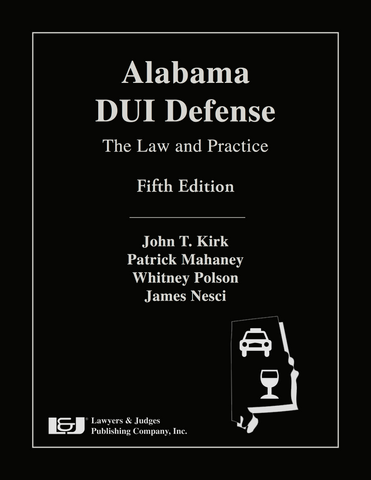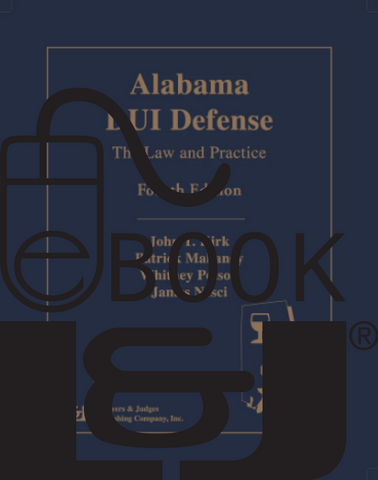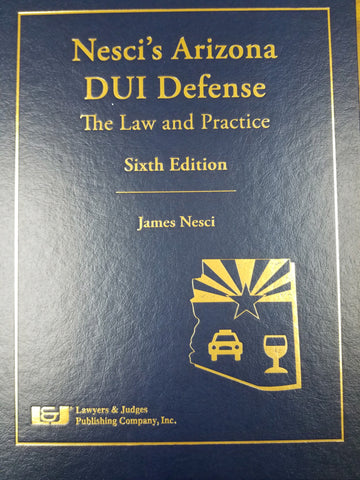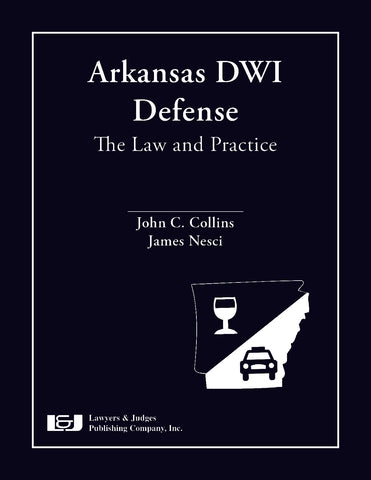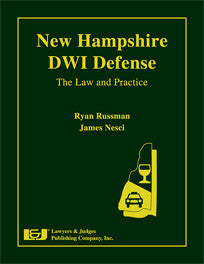
New Hampshire DWI Defense: The Law & Practice
- Author: James Nesci, Ryan Russman
- ISBN 10: 1-933264-53-5
- ISBN 13: 978-1933264-53-0
- Copyright Date Ed: April 1, 2010
- Pages: 272 pages
- Binding Information: Hardcover
- Size: 8.5 ✕ 11 Inches (US)
For even the most seasoned attorney, admitted to practice in the state of New Hampshire, defending DWI cases has always presented special challenges. Today mounting a successful defense is more difficult than ever. Now you have the advantage with New Hampshire DWI Defense: The Law and Practice . This text and DVD contains the most important information to help you attain a successful verdict.
Written by Ryan Russman and James Nesci, both Board Certified by the National College for DUI Defense,New Hampshire DWI Defense: The Law and Practice ensures that you understand the chemical, biological and technological concepts and issues underlying DWI prosecution and defense in the State of New Hampshire. The authors provide the most up-to-date information available on key areas of DWI law in New Hampshire including: DWI Investigations, Driving and Field Sobriety Testing, Drug Recognition, Evaluation and Chemical Testing, Blood Alcohol Calculations, Pre-trial Investigations and Motions, Practice, Plea Offers and Agreements, DWI Trial Procedures, and more.
Many practical tools and applications designed to streamline and simplify the complex DWI defense process have been developed along with this book. They are all included on a bonus DVD - so you can locate, review and print them out in a matter of seconds. The companion DVD contains NHTSA studies, articles and visual detection videos, as well as expanded sections on New Hampshire law and procedure.
Lawyers & Judges has published twenty state-specific DUI defense reference books. A practitioner in Colorado raved in the Colorado Lawyer that Colorado DUI Defense: The Law and Practice is “a must-have resource” and would make “a nice gift for the lawyers in your life who practice DUI defense.” The Wisconsin Lawyer reviewer gave Wisconsin OWI Defense: The Law and Practice a touchdown review, calling the book “the best book I have read pertaining to Wisconsin operating-while-intoxicated (OWI) law, and one of the best in dealing with the substance of OWI law.”
This book is also available as an E-book. Click here to purchase and download:
Book Topics Include:
- Types of DWI
- Role of the Motor Vehicle Division
- Pre-trial investigation
- DWI investigations
- Driving behavior
- Field sobriety testing
- Drug recognition
- Chemical testing for alcohol and drugs
- Blood alcohol calculations
- Use of expert witnesses
- Pre-trial motions
- Plea offers
- Revised sentencing charts
- DWI jury trial information
- Client relations
- Ethics and advertising
- New Hampshire Rules of Evidence
- Notices of proposed rulemaking
DVD topics include:
- USDOT "Drugs That Impair Driving" student manual and teacher manual
- USDOT "DWI Detection and Standardized Field Sobriety Testing" student manual and teacher manual
- SFST validation studies
- USDOT "SFST Refresher Training Course" student manual and teacher manual
- New Hampshire rules and regulations
- MVD court abstracts
- NHTSA "The Detection of DWI Motorcyclists" brochure
- NHTSA "Use of Sobriety Checkpoints for DUI" article
- NHTSA driving and blood alcohol concentration studies
- NHTSA visual detection videos
- And more!
Table of Contents
Table of Cases
How to Use This Book
Foreword
Chapter 1. Lawyer Advertising
1.1 Ethical Issues
1.2 Advertising Resources
Chapter 2. Client Relations
2.1 Meeting the Prospective Client
2.2 Retainer Agreements
2.3 Fees
2.4 IOLTA
2.5 Communications
2.6 Client Interview and Third Parties
Chapter 3. Driving While Intoxicated
3.1 Types of DWI
3.2 Class B Misdemeanor DWI
3.3 Class A Misdemeanor Aggravated DWI with No Bodily Injury
3.4 Class A Misdemeanor Second Offense DWI
3.5 Class A Misdemeanor Third Offense DWI
3.6 Fourth Offense Felony DWI
3.7 Felony Aggravated DWI With Serious Bodily Injury
3.8 In-Chapter Reference for Relevant Statutes
3.9 DMV Driver Points System
3.10 Homicide
3.11 Restitution
Chapter 4. Division of Motor Vehicles
4.1 Overview
4.2 The Admin per se/Implied Consent Form
4.3 Notice of Suspension
4.4 Administrative Review and Hearings
4.5 Administrative Review
4.6 Hearing on Order of Administrative License Suspension
4.7 Administrative License Suspension Appeal
4.8 Recantation of Refusal
4.9 Time Computations
4.10 Right to Attorney Prior to Taking Chemical Test
4.11 Reinstatement
4.12 Out-of-State Licenses
4.13 Appeals from DMV
4.14 Commercial Driver License Disqualifications
4.15 Suspension for Out-Of-State Violations
4.16 Validity of Out-of-State Licenses
Chapter 5. Pre-Trial Investigations
5.1 Overview
5.2 Visit the Scene
5.3 Tools to Have on Hand
5.4 Diagrams and Aerial Photography
5.5 Pretrial Interviews
5.6 Victim’s Rights
5.7 Victim’s Right to Refuse an Interview
5.8 Victim Conference with Prosecuting Attorney
Chapter 6. Pre-Trial Motions Practice
6.1 Overview
6.2 Procedural Motions
6.3 Substantive Motions
6.4 Motions in Limine
6.5 Evidentiary Hearings
Chapter 7. Plea Offers
7.1 Overview
7.2 Waiver of Rights
7.3 Collateral Consequences
7.4 Exposure of Prior Offenses
7.5 Immigration Consequences
7.6 Misdemeanor Plea Offers
7.7 Felony Plea Offers
Chapter 8. Trial
8.1 Overview
8.2 Voir Dire and Jury Selection
8.3 Jury Instructions
8.4 Opening Statements
8.5 Cross Examination
8.6 Direct Examination—The Accused
8.7 Closing Arguments
8.8 Sentencing
Chapter 9. DWI Investigations: Driving and Field Sobriety Testing
9.1 Overview: National Highway Traffic Safety Administration (NHTSA)
9.2 Driving Behavior
9.3 Standardized Field Sobriety Testing (SFST) Validation Studies
9.4 Legal Analysis and Summary of the SFST Validation Studies
9.5 Standardized Field Sobriety Test Battery
9.6 Horizontal Gaze Nystagmus (HGN)
9.7 One-Leg-Stand
9.8 Correlation Between BAC and HGN or FSTs
9.9 Commonly Used Non-Standardized/Validated Field Sobriety Tests
9.10 Videotaping the Driving and Investigation
Chapter 10. Drug Recognition Evaluation
10.1 Overview
10.2 DRE Statutory Law
10.3 Per Se Statutes Comparison
10.4 Impairment Statutes Comparison
10.5 Defenses
10.6 Implied Consent Laws Comparison
10.7 DRE Case Law
10.8 The 12-Step DRE Protocol
10.9 Deconstruction and Analysis of the 12-Step DRE Protocol
10.10 Effects of Various Drugs
10.11 Drug Evaluation Classification Protocol (DECP)
Chapter 11. Chemical Testing
11.1 Preliminary Breath Testing
11.2 Law
11.3 Safeguards
11.4 Evidential Breath Testing
11.5 Henry’s Law and the Blood to Breath Ratio
11.6 Infrared Light Absorption
11.7 Basic Operation
11.8 Intoxilyzer® Printouts
11.9 Breath Testing: Methods of Attack
11.10 Federal Requirements for Evidential Breath Testers (EBT)
11.11 Calibration
11.12 Statutory Requirements for Admissibility of Chemical Test Results
11.13 Blood Testing: From the Vein to the Lab
11.14 Headspace Gas Chromatography
Chapter 12. Blood Alcohol Calculations for Attorneys
12.1 Blood Alcohol Calculations for Attorneys
12.2 Determining the One-Drink Potential
12.3 Elimination and Retrograde Extrapolation
12.4 White’s Retrograde Extrapolation
Chapter 13. Expert Witnesses
13.1 Pretrial Preparation
13.2 Direct Examination of the Defense Expert Witness
13.3 Cross of the State’s Expert Witness
13.4 Direct Examination of the State’s Expert as a Defense Witness
Chapter 14. DWI Jury Trial Warpack
14.1 Aggravation
14.2 Actual Physical Control (APC)
14.3 Appellate Standard of Review
14.4 Arrest
14.5 Authentication
14.6 Blood Draws
14.7 Breath Testing
14.8 Burden of Proof
14.9 Chain of Custody
14.10 Closing Arguments—Ethical Considerations
14.11 Collateral Estoppel in DWI Cases
14.12 Comment of Defendant’s Silence
14.13 Confrontation
14.14 Corpus
14.15 Credibility of Witnesses
14.16 Destruction of Evidence
14.17 Directed Verdict
14.18 Double Jeopardy
14.19 DRE: Drug Recognition Evaluation Admissibility
14.20 Due Process
14.21 Evidence
14.22 Expert Witnesses
14.23 Field Sobriety Test Admissibility
14.24 Foundation
14.25 HGN
14.26 Impeachment
14.27 Independent Test
14.28 Jurors
14.29 Jury Deliberations
14.30 Jury Instructions
14.31 Jury Trial Right
14.32 Miranda
14.33 DMV
14.34 Plea Agreements
14.35 Prior Convictions
14.36 Probable Cause
14.37 Reasonable Suspicion
14.38 Record Preservation for Appeal
14.39 Relation Back
14.40 Actual Prejudice
14.41 Searches
14.42 Sentencing
14.43 Voir Dire
14.44 Voluntariness of Statements
14.45 Warrants
Appendix A. New Hampshire Rules of Evidence
Appendix B. Breath Alcohol Procedure Using the Intoxilyzer® 5000 Instrument
Appendix C. IOLTA
Appendix D. DWI—Modern Day Salem Witch Hunts
Appendix E. The Aging Process and FSTs

